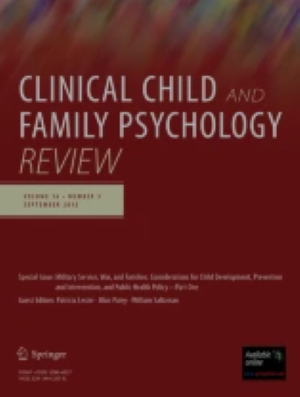Youth Justice Services: Relationships, Rehabilitation and the Reality of the Young People Involved-A Meta-synthesis of the Qualitative Literature.
IF 6.1
1区 心理学
Q1 PSYCHOLOGY, CLINICAL
引用次数: 0
Abstract
Rehabilitative approaches to working with young people in the youth justice system have been identified as effective in reducing recidivism, with the centrality of relationships being core to these approaches. There is a limited evidence base exploring young people's experience of professional relationships within youth justice systems. This review aims to explore young peoples' experience of relationships with professionals within youth justice services and understand what is important to their engagement. Five databases were systematically searched for relevant peer-reviewed qualitative and mixed-method journal articles. Seven papers were included in this review. Data were analysed using a meta-synthesis approach. PRISMA and ENTREQ guidelines were followed. Analyses yielded four themes: Feeling valued and finding worth in the system; The reciprocal nature of understanding and respect; nobody trying to help and no one to try for; and the importance of having one good person. The importance of the relationships between youth justice professionals and young people are discussed. Limitations and implications for research, practice and policy are also discussed.青少年司法服务:关系、康复与青少年的现实——质性文献的元综合。
在青年司法系统中与年轻人一起工作的康复方法已被确定为减少再犯的有效方法,其中关系的中心地位是这些方法的核心。在青年司法系统中,探索年轻人职业关系经历的证据基础有限。这项审查旨在探索年轻人与青年司法服务专业人员的关系经验,并了解对他们的参与至关重要的是什么。系统地检索了5个数据库,检索了相关的同行评议的定性和混合方法期刊文章。本综述共收录了7篇论文。使用综合方法对数据进行分析。遵循PRISMA和ENTREQ指南。分析产生了四个主题:感觉被重视并发现系统中的价值;理解和尊重的相互性质;没有人试图帮助,也没有人去尝试;还有一个好人的重要性。讨论了青年司法专业人员与年轻人之间关系的重要性。本文还讨论了对研究、实践和政策的限制和影响。
本文章由计算机程序翻译,如有差异,请以英文原文为准。
求助全文
约1分钟内获得全文
求助全文
来源期刊

Clinical Child and Family Psychology Review
PSYCHOLOGY, CLINICAL-
CiteScore
10.50
自引率
4.30%
发文量
45
期刊介绍:
Editors-in-Chief: Dr. Ronald J. Prinz, University of South Carolina and Dr. Thomas H. Ollendick, Virginia Polytechnic Institute Clinical Child and Family Psychology Review is a quarterly, peer-reviewed journal that provides an international, interdisciplinary forum in which important and new developments in this field are identified and in-depth reviews on current thought and practices are published. The Journal publishes original research reviews, conceptual and theoretical papers, and related work in the broad area of the behavioral sciences that pertains to infants, children, adolescents, and families. Contributions originate from a wide array of disciplines including, but not limited to, psychology (e.g., clinical, community, developmental, family, school), medicine (e.g., family practice, pediatrics, psychiatry), public health, social work, and education. Topical content includes science and application and covers facets of etiology, assessment, description, treatment and intervention, prevention, methodology, and public policy. Submissions are by invitation only and undergo peer review. The Editors, in consultation with the Editorial Board, invite highly qualified experts to contribute original papers on topics of timely interest and significance.
 求助内容:
求助内容: 应助结果提醒方式:
应助结果提醒方式:


